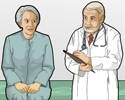High blood pressure - what to ask your doctor
Definition
When your heart pumps blood into your arteries, the pressure of the blood against the artery walls is called your blood pressure. Your blood pressure is given as two numbers: systolic over diastolic blood pressure. Your systolic blood pressure is the highest blood pressure during the course of your heart beat cycle. Your diastolic blood pressure is the lowest pressure.
When your blood pressure gets too high, it puts extra stress on your heart and blood vessels. If your blood pressure stays high all the time, you will be at a higher risk for heart attacks and other vascular (blood vessel) diseases, strokes, kidney disease, and other health problems.
Below are questions you may want to ask your health care provider to help you take care of your blood pressure.
Alternative Names
What to ask your doctor about high blood pressure; Hypertension - what to ask your doctor
Questions
How can I change the way I live to lower my blood pressure?
- What is a heart-healthy diet? Is it OK to ever eat something that is not heart healthy? What are some ways to eat healthy when I go to a restaurant?
- Do I need to limit how much salt I use? Are there other spices that I can use to make my food taste good?
- Is it OK to drink alcohol? How much is OK?
- What can I do to stop smoking? Is it OK to be around other people who are smoking?
Should I check my blood pressure at home?
- What type of equipment should I buy? Where can I learn how to use it?
- How often do I need to check my blood pressure? Should I write it down and bring it to my next visit?
- If I cannot check my own blood pressure, where else can I have it checked?
- What should my blood pressure reading be? Should I rest before taking my blood pressure?
- When should I contact my provider?
What is my cholesterol? Do I need to take medicines for it?
Is it OK to be sexually active? Is it safe to use sildenafil (Viagra), or tadalafil (Cialis), vardenafil (Staxyn), or avanafil (Stendra) for erection problems?
What medicines am I taking to treat high blood pressure?
- Do they have any side effects? What should I do if I miss a dose?
- Is it ever safe to stop taking any of these medicines on my own?
How much activity can I do?
- Do I need to have a stress test before I exercise?
- Is it safe for me to exercise on my own?
- Should I exercise inside or outside?
- Which activities should I start with? Are there activities or exercises that are not safe for me?
- How long and how hard can I exercise?
- What are the warning signs that I should stop exercising?
References
Bakris GL, Sorrentino MJ. Systemic hypertension: mechanisms, diagnosis, and treatment. In: Libby P, Bonow RO, Mann DL, Tomaselli GF, Bhatt DL, Solomon SD, eds. Braunwald's Heart Disease: A Textbook of Cardiovascular Medicine. 12th ed. Philadelphia, PA: Elsevier; 2022:chap 26.
Centers for Disease Control and Prevention website. High blood pressure. www.cdc.gov/high-blood-pressure/about/index.html. Updated January 28, 2025. Accessed March 10, 2025.
Whelton PK, Carey RM, Aronow WS, et al. 2017 ACC/AHA/AAPA/ABC/ACPM/AGS/APhA/ASH/ASPC/NMA/PCNA guideline for the prevention, detection, evaluation, and management of high blood pressure in adults: a report of the American College of Cardiology/American Heart Association Task Force on Clinical Practice Guidelines. J Am Coll Cardiol. 2018;71(19):e127-e248. PMID: 29146535 pubmed.ncbi.nlm.nih.gov/29146535/.
Reviewed By: Jacob Berman, MD, MPH, Clinical Assistant Professor of Medicine, Division of General Internal Medicine, University of Washington School of Medicine, Seattle, WA. Also reviewed by David C. Dugdale, MD, Medical Director, Brenda Conaway, Editorial Director, and the A.D.A.M. Editorial team.




